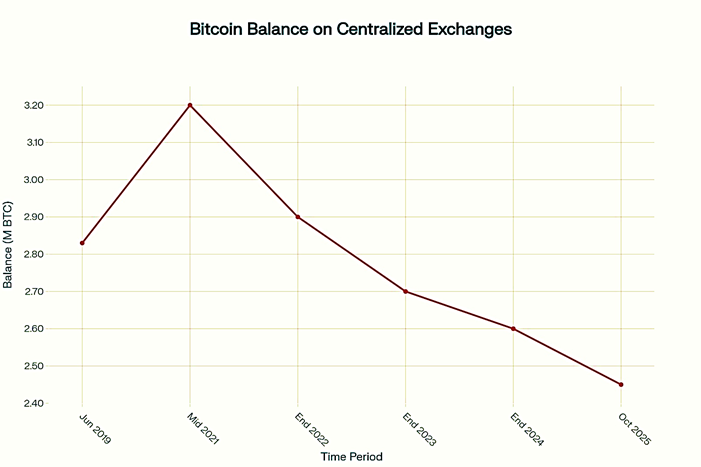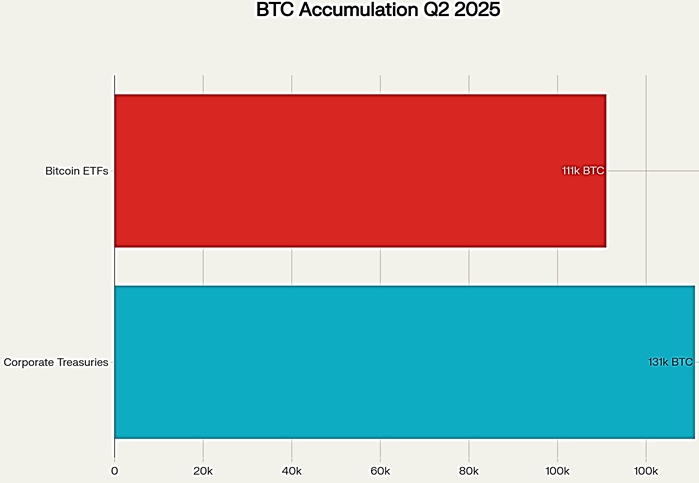Eos Energy stock falls after Fuzzy Panda issues short report
Bitcoin shattered its previous all-time high Sunday, climbing to $125,689 as a severe exchange supply shortage collided with the second-largest weekly ETF inflow since spot products launched in January 2024.
The rally matters because it’s driven by structural forces, not speculation. Institutional money is flooding in while available Bitcoin vanishes from exchanges at an alarming rate, creating supply-demand conditions that could push prices toward $135,000 in coming weeks.
ETF Flows Accelerate
U.S. spot Bitcoin ETFs attracted $3.24 billion during the first week of October, reversing $902 million in September outflows. BlackRock’s iShares Bitcoin Trust (NASDAQ:IBIT) captured $1.78 billion of those flows, bringing its total assets to $96.2 billion. This places IBIT among the top 20 ETFs globally by assets under management.
Fidelity’s FBTC added $692 million, while smaller funds like ARK 21Shares and Bitwise contributed $254 million and $212 million respectively.
The pace of accumulation matters. At current rates, fourth-quarter ETF flows could remove more than 100,000 BTC from circulation—double the new Bitcoin created through mining during the same period. "ETF buying is accelerating while long-term holders sell less, helping Bitcoin build support near key technical levels," said one market analyst tracking the flows.
Exchange Balances Hit Historic Low
While ETF headlines dominate, a quieter crisis unfolds on cryptocurrency exchanges. Bitcoin balances on centralized platforms dropped to 2.83 million BTC, the lowest level since June 2019 when Bitcoin traded around $8,000. CryptoQuant reports an even lower figure: 2.45 million BTC, representing a seven-year low.
More than 114,000 BTC (worth over $14 billion) left exchanges in the two weeks before the rally. This mass exodus signals a shift toward long-term holding, with Bitcoin moving into self-custody wallets, institutional accounts, and corporate treasuries rather than sitting on exchanges ready for sale.
The supply shortage has reached critical levels. VanEck’s Matthew Sigel warned that "exchanges are running out of Bitcoin," while investor Mike Alfred reported a major OTC desk operator expected to be "completely out of Bitcoin to sell within two hours" unless prices hit $126,000-$129,000.
Professional trading desks that handle billion-dollar transactions cannot find inventory.

The steady decline to seven-year lows illustrates why OTC desks are running out of inventory. When Bitcoin leaves exchanges, it typically moves into long-term storage, thus removing selling pressure from the market.
Large Holders Accumulate Aggressively
Whales accumulated over 30,000 BTC in the 48 hours before October 3. Recent activity includes newly created wallets withdrawing massive amounts: one moved 620 BTC ($76 million) from Binance, while another pulled 26,029 ETH ($118 million) from Kraken.
Public companies collectively hold 848,100 BTC, representing 4% of Bitcoin’s total supply. MicroStrategy (NASDAQ:MSTR)leads with over 638,460 BTC purchased at an average price of $73,880 per coin. But the trend spreads beyond MicroStrategy. Standard Chartered data shows 61 publicly listed companies have adopted bitcoin treasury strategies, with collective holdings growing 18% in Q2 2025 alone, outpacing ETF accumulation.
Corporate treasuries bought approximately 131,000 bitcoins in Q2, compared to ETFs’ 111,000 BTC. That’s institutional adoption accelerating beyond the ETF narrative Wall Street celebrates.
Government Shutdown Adds Fuel
Also emerged an unexpected catalyst: Washington’s dysfunction. The U.S. government shutdown that began October 2 has driven investors toward Bitcoin as a hedge against political chaos and currency debasement. This "debasement trade" has gained momentum, with Bitcoin now trading with correlation to U.S. government risk measured by Treasury term premiums.
"The shutdown matters this time," said Standard Chartered’s Geoff Kendrick, noting Bitcoin now serves as a legitimate alternative store of value during political uncertainty, unlike the 2018-2019 shutdown when the cryptocurrency "was in a different place."
Tether Provides Fresh Liquidity
Behind the scenes, stablecoin issuance provided crucial liquidity. Tether minted $2 billion USDT on Ethereum in early October, following a historical pattern where large issuances precede or coincide with Bitcoin rallies. The broader stablecoin market added $6.1 billion in the week before Bitcoin’s breakthrough.

Corporate treasuries outpaced ETFs in Bitcoin accumulation during Q2 2025, a less-publicized driver of demand
What Comes Next
Standard Chartered projects Bitcoin could reach $135,000 near-term and potentially $200,000 by year-end. The bank’s analysis suggests Bitcoin has broken free from traditional post-halving cycles due to institutional adoption and ETF demand.
Key catalysts ahead include sustained ETF inflows projected to hit $20 billion additional by year-end, continued corporate treasury adoption, and the structural supply shortage deepening across exchanges. October’s historical performance (Bitcoin has posted gains in nine of the past ten Octobers) adds seasonal tailwinds.
The convergence of institutional legitimacy, supply scarcity, and macroeconomic uncertainty has created conditions where Bitcoin’s "digital gold" narrative faces its most significant real-world test. October 2025 may be remembered not just for price records, but as the moment Bitcoin definitively crossed from alternative asset to mainstream financial infrastructure.
